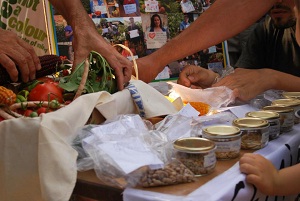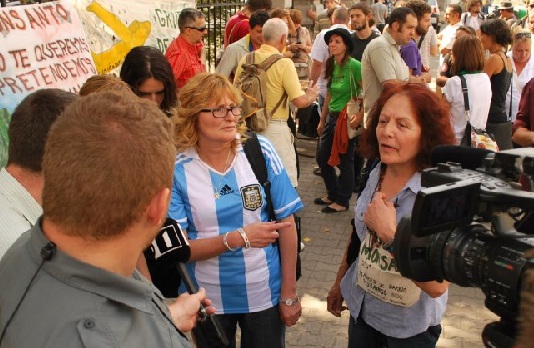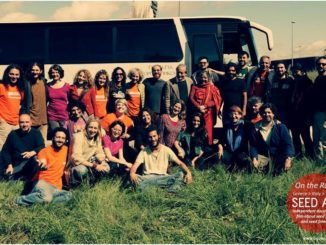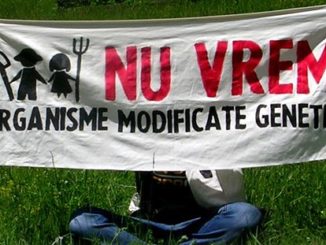On 14 September, Romanian peasants staged a demonstration in front of the Ministry for Agriculture in Bucharest. During the protest, small farmers together with activists, specialists and Romanian consumers expressed their demands for the future of European farming. The protest formed part of the series of events that have been organised in recents weeks across Europe as part of the Good Food March.
 Protesters gathered behind an iron fence put in front of the Romanian Ministry for Agriculture. During the event, the participants organized a brunch with traditional, organic products, brought by the peasants. A traditional seed exchange also took place in front of the Ministry, between peasants and urban gardeners. It is important to mention that distribution and comercialization of traditional seeds is illegal. The seed exchange was therefore a form of protest, to show the injustice against peasants who have the fundamental right to have free access to traditional seeds.
Protesters gathered behind an iron fence put in front of the Romanian Ministry for Agriculture. During the event, the participants organized a brunch with traditional, organic products, brought by the peasants. A traditional seed exchange also took place in front of the Ministry, between peasants and urban gardeners. It is important to mention that distribution and comercialization of traditional seeds is illegal. The seed exchange was therefore a form of protest, to show the injustice against peasants who have the fundamental right to have free access to traditional seeds.
The protest was followed by a session of discussions, in the context of the market monopoly imposed by industrial corporations.
 Sofia Gatica and Maria del Milagro Godoy, representatives of the Mothers of Ituzaingo from Argentina, joined the protest. Sofia and Maria are known around the world for their struggle against Monsanto. Their efforts were honored with the Goldman Environmental Prize in 2012. “We came to warn the Romanian farmers about the danger of the genetically modified soy. In Argentina, we fight against Monsanto, who poissons our land and the health of our children. We learned that the Romanian peasants represent 50% of the total number of peasants in the EU. Do not sell your health to Monsanto. Learn from our mistakes!” declared Sofia Gatica, during the protest.
Sofia Gatica and Maria del Milagro Godoy, representatives of the Mothers of Ituzaingo from Argentina, joined the protest. Sofia and Maria are known around the world for their struggle against Monsanto. Their efforts were honored with the Goldman Environmental Prize in 2012. “We came to warn the Romanian farmers about the danger of the genetically modified soy. In Argentina, we fight against Monsanto, who poissons our land and the health of our children. We learned that the Romanian peasants represent 50% of the total number of peasants in the EU. Do not sell your health to Monsanto. Learn from our mistakes!” declared Sofia Gatica, during the protest.
“We, the peasants, were not affected by the drought, because we use traditional seeds, adapted to the local conditions. We don’t need corporate seeds. We want to be left to make food for consumers in the areas where we live, without being challenged by national and European agriculture policies” added Willy Schuster, co-president of EcoRuralis.
“We want to get the attention of the Romanian authorities. They must develop a dialogue with us and to understand that we have demands. We need local markets, the possibility to sell our products close to the region where we produce them, the possibility to use our traditional seeds. We demand the fundemantal right of not being contaminated with genetically modified organisms, this being a large issue in agriculture. We want the authorities to look with caution towards the issue of land grabbing. Almost 10% of Romanian land has been already bought by foreign investors”, concluded Dan Cismas, a peasant from Mures county.





